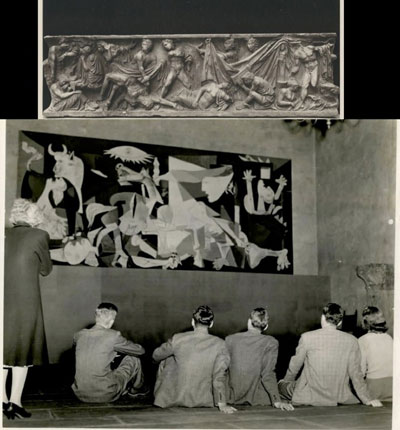 Wir weisen auf einen hoch interessanten Vortrag von Francisco Prado Vilar (Santiago de Compostela) hin, der morgen
Wir weisen auf einen hoch interessanten Vortrag von Francisco Prado Vilar (Santiago de Compostela) hin, der morgen
am 23.11.2022 von 18:15 – 20 Uhr
am Zentralinstitut für Kunstgeschichte in München stattfinden wird und den man auch via Zoom verfolgen kann. In der Veranstaltungsankündigung heißt es:
During the spring of 1937, as Picasso worked tirelessly on Guernica at his Parisian studio, conjuring up images of despair, destruction and fratricidal violence to capture the tragedy of the Spanish Civil War, the basement of the National Archaeological Museum in Madrid had become a bunker where many of the artworks he had long admired were being stored away to keep them safe from the bombings. Among them was a Roman sarcophagus decorated with a Greek family tragedy, which unfolds on an elongated frieze in a sudden explosion of violence rippling out in chiastic movements. In the center is Orestes who, having just slayed his mother Clitemnestra and her lover to avenge the assassination of his father Agamennon, begins to ponder the consequences of his atrocious crime. This lecture explores the active presence of the imagery of this sarcophagus in the context of the Spanish Civil War, and in the lives of those involved in the making of Guernica.
Francisco Prado-Vilar (auf Twitter: @fpradovlr) ist Distinguished Researcher an der Universität Santiago de Compostela. Er promovierte an der Harvard University und hatte anschließend Lehr- und Forschungsstellen in Princeton, an der University of London (Birkbeck), an der Complutense University in Madrid und in Stanford inne. Bevor er an die Universität von Santiago kam, war er Projektleiter am Royal Complutense College in Harvard, wo er jetzt als Senior Research Associate tätig ist.
Alle Informationen und der Zoom-Link zum Vortrag:
Francisco Prado Vilar: Picassos Nachleben: Tragedy, Exile, and the Visual Archaeology of Guernica.